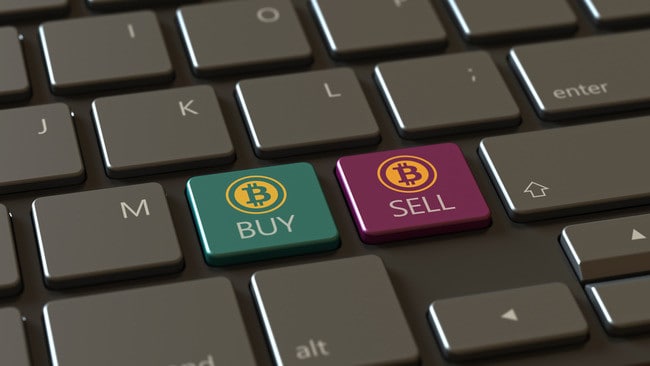It’s easy to buy Bitcoin (BTC) on an exchange, but is it worth the risk? After all, if you look at the news, it seems that a different crypto exchange gets hacked or disappears each week, taking with it customer funds. A few weeks ago, the news of the possible Bitsane exit scam broke and Coinmama asked, “Are Bitcoin Exchanges Safe?” Today we’re taking a deeper dive into the question, looking at what exactly crypto exchanges are, how they work, and how you can protect yourself and your investment when you buy Bitcoin.
What is a Bitcoin exchange?
A cryptocurrency exchange is a place where you can buy, sell, or trade BTC for fiat (that is, government-backed currencies) or other cryptocurrencies. They work by serving as the middle-man between two people—one who wants to buy Bitcoin, and the other who wants to sell it. When the selling price matches what a buyer is looking to pay, or vice versa, the exchange will transfer the coins and funds from one user to the other. In many ways, a Bitcoin exchange functions exactly the way the stock market functions: users will place a “market order” which asks the exchange to buy BTC on their behalf at the best possible price, or they’ll place a “limit order” which allows the exchange to buy coins on their behalf at the best possible price up to a specified maximum, or to sell them for the most money down to a specified minimum. A market order allows the user to buy or sell coins almost instantly. A limit order, on the other hand, may take longer to execute, but gives the buyer or seller more control over their trade.
On a crypto exchange, transactions can be made for fiat or for other coins, with most exchanges offering the option to trade several cryptocurrencies to BTC, as well as some additional common pairs such as trading to Ethereum (ETH) or Ripple (XRP). The exchange charges a small fee for transactions or for depositing or withdrawing funds.
If all this sounds simple enough, you may be asking, “where’s the catch?” One of the big problems with cryptocurrency exchanges is that they require the user to deposit funds into their account, be it in the form of fiat currency or as coins. On the one hand, that makes it easy to execute trades, but on the other hand, it leaves you vulnerable as you’re trusting the exchange with your cryptocurrency. (You’re also trusting the exchange with your bank or credit card information, but that’s easier to recover if it’s stolen.) When you hold your cryptocurrency on an exchange, you no longer have control over it; the exchange does. And as exchanges are currently under-regulated and often under-insured, if an exchange’s wallet is hacked, or if the exchange decides to suddenly exit the business, there’s no way to recover your funds. It’s something Mt. Gox users learned as far back as 2014 when the exchange shut down; something QuadrigaCX users learned in late 2018 when the founder died taking the private keys to the exchange’s wallet with him; and something users of many other exchanges have seen as well. In other words, storing your coins on an exchange is akin to depositing your funds in an unregulated, uninsured bank and hoping for the best.
Recent Bitcoin exchange hacks
The Mt. Gox hack of 2014 is by far the most well-known exchange hack of the Bitcoin era. When it happened, cryptocurrency was still fairly new, and Mt. Gox was handling around 70% of all BTC transactions. Even at Bitcoin’s relatively low price at the time, the hack wiped out 850,000 BTC, which was worth about $450 million. If those Bitcoins were still in the hands of their owners today, they’d be collectively worth $9 billion.
But Mt. Gox is only one in a long line of Bitcoin exchange hacks and disappearances, and these days it seems that a new one pops up every week. Just this week, $32 million was stolen from Bitpoint in Japan; last week, Polish exchange BitMarket unexpectedly shut down; and the week before that, Irish exchange Bitsane seemingly disappeared in an exit scam. In each of these cases, users have to wait to see what happened to their funds.
While there are exchanges that are insured, most of the smaller exchanges are not, and storing your funds on them often means taking a risk.
Is Coinmama an exchange?
The short answer is “No.” The long answer is that Coinmama is often listed among exchanges on the internet—after all, we provide an easy way to buy and sell Bitcoin—yet Coinmama is more of a cryptocurrency vendor, as we differ from exchanges in a few very fundamental ways:
Coinmama facilitates the buying and selling of cryptocurrency with a credit card, debit card, or bank transfer. When you buy BTC from us, you’re buying directly from us, and not from a third-party for which we act as the middle-man. Additionally, we are not a trading platform, and you can only buy crypto with fiat.
Coinmama never stores customer funds, be it crypto or fiat. When you buy Bitcoin from us, you send it to the cryptocurrency wallet of your own choice, putting you in control of your own funds. This means you don’t have to worry about someone else having access to your wallet’s private keys, or your funds being kept on an exchange’s hot wallet that’s susceptible to hacking. Additionally, we never store your credit card or bank account information. For wallets, We recommend using the Coinmama Crypto Wallet to safely store your bitcoin. It’s the safest option in the market and allows users in every part of the world to store their own crypto.


When are Bitcoin exchanges useful?
While crypto exchanges have a lot of drawbacks, they can also be beneficial. If you plan on trading BTC often and need to react to the changes in the market, or if you plan on changing between different coins, having some of your funds on an exchange gives you the ability to trade quickly.
However, for most people, buying cryptocurrency is a long-term investment. Many people may add to their investment occasionally, but are unlikely to need fast access their coins. For anyone using the “buy and HODL” (that’s hold on for dear life, and it refers to making a long-term investment) strategy of investing in cryptocurrency, funding an exchange account and keeping your money on it may be an unnecessary risk that could end up costing you your investment.
The biggest step you can take to keep your funds safe is to have control over them. That means setting your wallet up yourself, not giving your coins or private keys to anyone else, and being in charge of maintaining it. If you’re a HODLer, you can increase your safety by storing your coins in a cold (offline) wallet, or spreading your coins out over multiple wallets. You can read more about how to keep your investment safe here.
At Coinmama, we think the future of money is one where we, the people, have control over our own economy. It’s why we give our users the ability to secure their own Bitcoin and why we don’t store users’ funds.



